Ethiopia's Tigray conflict: Suspicion and sacrifice as fighting spreads
- Published
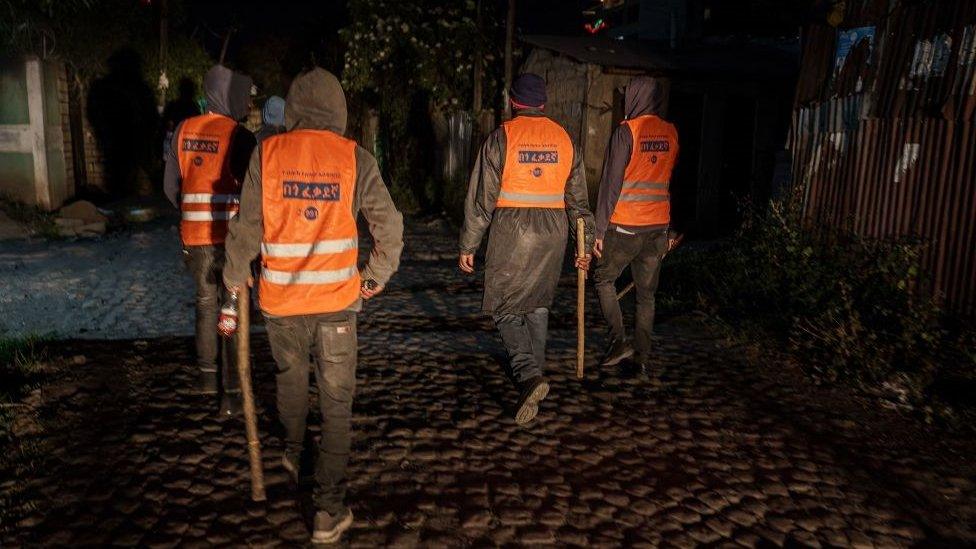
Volunteers conduct a night patrol on the lookout for suspicious activity earlier this month
After dark, in a residential neighbourhood in Ethiopia's capital, Addis Ababa, dozens of civilian volunteers were busy patrolling their streets one night last week, stopping and searching cars and checking documents.
"Our neighbourhood committee includes about 180 people. We've apprehended many people. And we've found a lot of suspicious materials, including guns and explosive devices," said an older man who appeared to be co-ordinating the searches.
The volunteers are searching for Tigrayan rebels, and their supporters, under new state of emergency regulations introduced by the Ethiopian government in response to a Tigrayan military offensive.
Critics say thousands of people have been unjustly detained, but the clampdown appears to have widespread support in the capital.
"Hurry, he is trying to escape," said another man, suddenly, speaking into his mobile phone.
A few streets away, a new group of mostly elderly volunteers had gathered for training, marching more or less in step and listening to instructions.
The overall mood in the capital appears to be calm.
Although the UK and other countries have warned that the security situation is "deteriorating," as Tigrayan and other rebel groups report that they are advancing towards the city, the Russian embassy sent a very different message on social media.
It declared that "the introduction of a state of emergency has not brought any significant changes to the everyday rhythm of life of the Ethiopian capital".
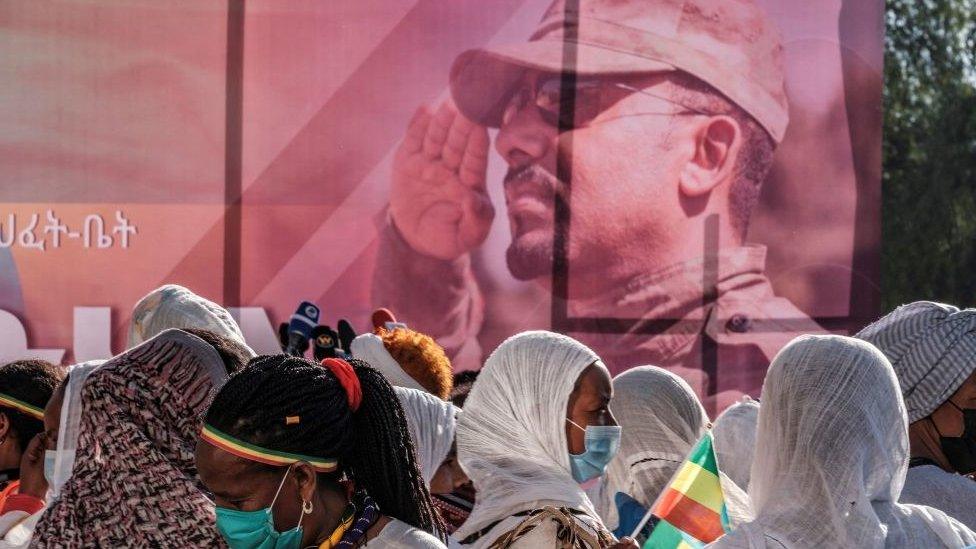
The prime minister has the rank of lieutenant colonel in the army
Ethiopia's Prime Minister Abiy Ahmed recently announced he was heading to the frontlines to lead his troops.
Video footage, provided by the government, showed him in uniform surrounded by soldiers, apparently in the arid Afar region north-east of the capital.
"We have now managed to clear the area completely," Prime Minister Abiy said in the footage.
"The morale of the defence forces is really great. We will continue until Ethiopia's freedom is ensured," he continued.
The prime minister said his troops were in the process of seizing several towns from the Tigray People's Liberation Front (TPLF).
But those claims are difficult to verify with access and communications in the conflict areas restricted, and the introduction of new rules forbidding the publication of any military movements or "battlefield outcomes" not sanctioned by the government.
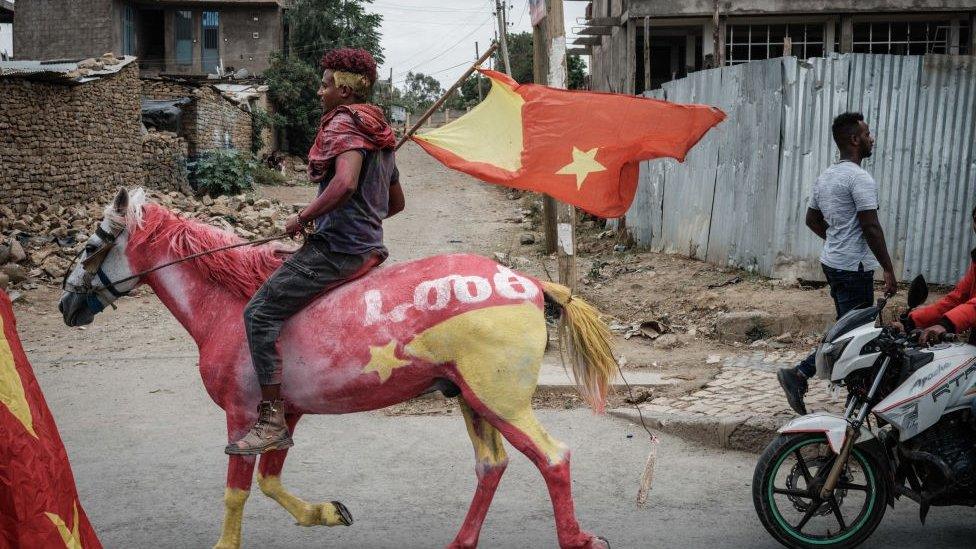
A man carrying the Tigray flag celebrates the TPLF's territorial gains in June
TPLF officials - who recently shared drone footage of thousands of Ethiopian prisoners of war - insist they are continuing to advance on several fronts, with much of the focus now on a key city, Debre Birhan, widely seen as the last major Ethiopian defensive position outside the capital.
But some analysts warn that the Tigray forces may be overstretched, and vulnerable to counter-attack, and a possible offensive from neighbouring Eritrea.
People falling into 'dire' situations
Regardless of which side is winning, it is clear that the conflict is spreading, and with it, Ethiopia's humanitarian crisis.
The UN's World Food programme (WFP) now estimates that 9.4 million people are in need of support.
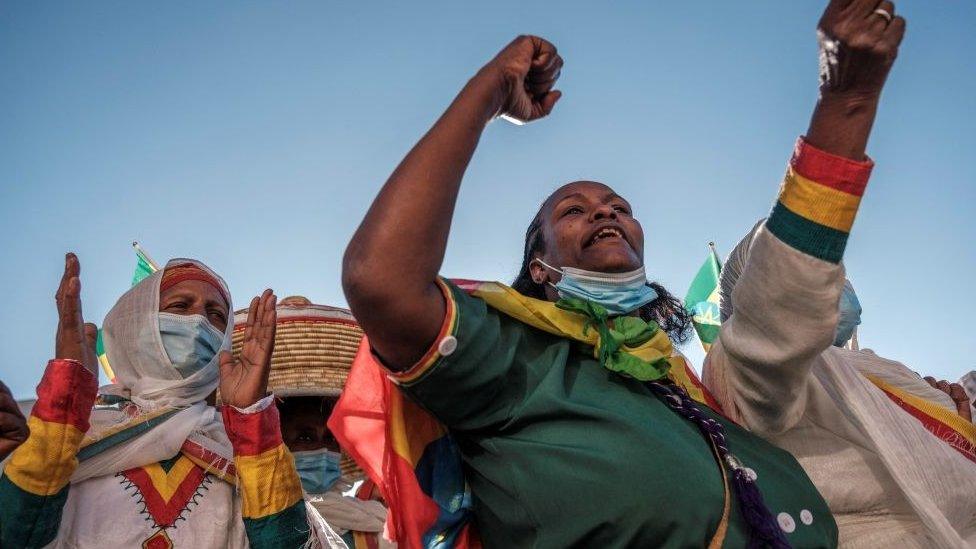
These women are at a rally to support the government forces against Tigray rebels
"As a volatile conflict spreads across the north of Ethiopia we're seeing more and more populations fall into a dire situation," said Claire Neville, a WFP official in Addis.
She blamed a "multitude of factors" currently limiting humanitarian access, including the Tigrayan rebel offensives, insecurity, and continuing bureaucratic delays from the Ethiopian authorities.
But the WFP has recently managed to reach thousands of people in two Amhara towns seized by Tigrayan forces.
At war with 'traitors'
In Addis, the governing Prosperity Party continues to organise public ceremonies to thank those who are volunteering to fight.
"We are at war with local traitors, and with their foreign backers," said Etisa Deme, a city council member.
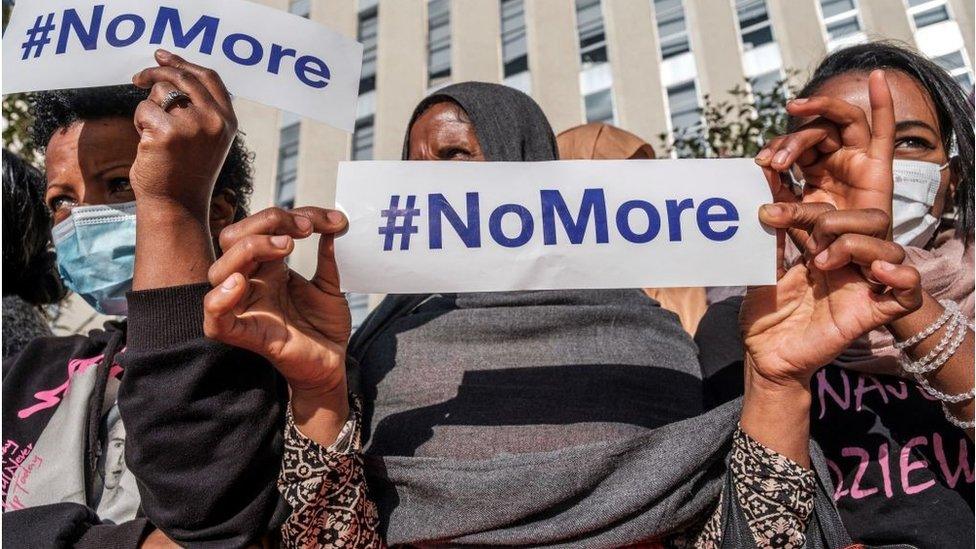
Some Ethiopians are demonstrating against what they call foreign interference in the conflict
"I was called to go and fight for my country's honour. You can cry if your family is killed, but where do you go if you lose your country? That's why I am ready to sacrifice my life. I'm not afraid that we've not had any training yet," said a 22-year-old man, Babush Sitotaw.
A grey-haired woman, Dinkinesh Nigatu, also came forward and was presented to the crowd.
"I love my country. I wanted to go to the front but both my son and my husband told me to stay at home and they would go to fight on my behalf," she said.
"So I've trained as a volunteer and I'm patrolling the streets now as my sons and husband fight on the frontlines. Whenever I see people on the streets, I tell them to go and fight. We mustn't wait until [the enemy] comes here to kill us all," she told the BBC.
"She is an icon. A beacon for all of you," declared Ayda Awol, an official from the governing Prosperity Party, with her arm around Ms Dinkinesh's shoulder.
"We expect many younger people to follow this example. The spirit of Ethiopia is now stronger than ever. More than 7,000 individuals [from the capital's Arada district] have volunteered to help their country," Ms Ayda continued.
Accusations of 'neo-colonial misinformation'
The Ethiopian government has complained of a deliberate campaign by Western governments and media organisations to misrepresent the nature of the conflict.
Many Ethiopians appear to agree, taking to social media to criticise "colonial" attempts to undermine their nation and exaggerate the successes of the TPLF.
"We [are] under attack on two fronts. A neo-colonial misinformation and disinformation campaign by western mainstream media, including BBC, and a genocidal war declared by the TPLF," said the Ethiopian political analyst Achamyeleh Ewunetu, who described himself as bitter critic of the Ethiopian government but a defender of his country's sovereignty.
The Ethiopian government has repeatedly declined the BBC's requests for interviews.
It has been widely criticised for clamping down on local and foreign media, for using increasingly violent rhetoric, and for restricting access and communications.
Prime Minister Abiy, who won praise before the conflict for releasing political prisoners and journalists, has recently been accused of re-imposing a climate of intimidation on sections of the media.
Meanwhile, the BBC says it remains committed to independent, accurate and impartial reporting from the region and the wider world.
More on the Tigray crisis:
ANALYSIS: How Ethiopia's once mighty army has been outflanked
WATCH: How the fighting is hampering aid efforts
Ongoing fighting across several states in Ethiopia is hampering humanitarian efforts